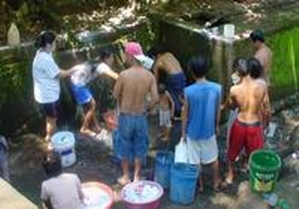

In 1996, the water situation in Olongapo City, like that of Metro Manila and other large urban areas, was becoming critical. Water facilities were fully depreciated, and mostly dilapidated. Raw water source was so scarce in the City that it could hardly meet the growing demands of its population. since the formar water district lacked the capital needed to adequately rehabilitate the water system, it was unable to upgrade the infrastructure. This invariably led to:

In the Freeport, however, there was abundant water supply more than enough for the requirement of the locators and residents in the former naval facility.
Clearly, there was a need for complementation between the two contiguous areas coupled by a need for a more efficient water utility. The preferred option to address this was the privatization of the water supply system in the City and in the Freeport. Thus, Subicwater was formed. The arrangement was beneficial not only because it would provide a superior level of water service to the City and the freeport but it would also benefit the government in the following ways:
Olongapo City and the Subic Bay Metropolitan Authority need not allocate financial and human resources, yet they would receive lease payments over a 25 year period and dividends as each has a 10% and 20% equity in Subicwater, respectively;
Assets owned by the government would still belong to it, as these were merely leased by Subicwater, not purchased nor transferred;
The
people of Olongapo City would be assured of a high level of service at a
reasonable price as ascertained by an independent Regulator.
Copyright (c) 2007. Subic Water & Sewerage Co. Inc.